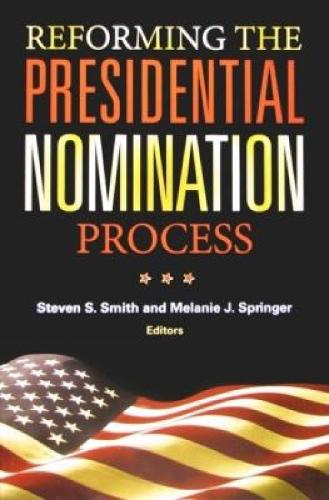
Reforming the Presidential Nomination Process
(Paperback)
Publishing Details
Reforming the Presidential Nomination Process
By (Author) Steven S. Smith
Edited by Melanie J. Springer
Bloomsbury Publishing PLC
Brookings Institution
19th March 2009
United States
Classifications
Professional and Scholarly
Non Fiction
324.0973
Physical Properties
Paperback
222
Width 153mm, Height 228mm, Spine 14mm
318g
Description
"
The 2008 U.S. presidential campaign has provided a lifetime's worth of surprises. Once again, however, the nomination process highlighted the importance of organization, political prowess, timing, and money. And once again, it raised many hackles. The Democratic contest in particular generated many complaintsfor example, it started too early, it was too long, and Super Tuesday was overloaded. This timely book synthesizes new analysis by premier political scientists into a cohesive look at the presidential nomination processthe ways in which it is broken and how it might be fixed.
The contributors to Reforming the Presidential Nomination Process address different facets of the selection process, starting with a brief history of how we got to this point. They analyze the importanceand perceived unfairnessof the earliest primaries and discuss what led to record turnouts in 2008. What roles do media coverage and public endorsements play William Mayer explains the ""superdelegate"" phenomenon and the controversy surrounding it; James Gibson and Melanie Springer evaluate public perceptions of the current process as well as possible reforms. Larry Sabato (A More Perfect Constitution) calls for a new nomination system, installed via constitutional amendment, while Tom Mann of Brookings opines on calls for reform that arose in 2008 and Daniel Lowenstein examines the process by which reforms may be adoptedor blocked.
"Reviews
"The editors of this volume leave no stone unturned in recounting 2008's primary contests.... the book offers a significant contribution to the growing reform debate." Shane D'Aprile, Politics Magazine
Author Bio
Steven S. Smith is the Kate M. Gregg Professor of Social Sciences at Washington University in St. Louis, where he directs the Weidenbaum Center on the Economy, Government, and Public Policy. His many books include Party Influence in Congress (Cambridge, 2007). Melanie J. Springer is an assistant professor of political science at Washington University, where she is a fellow in the Center on Political Economy.
